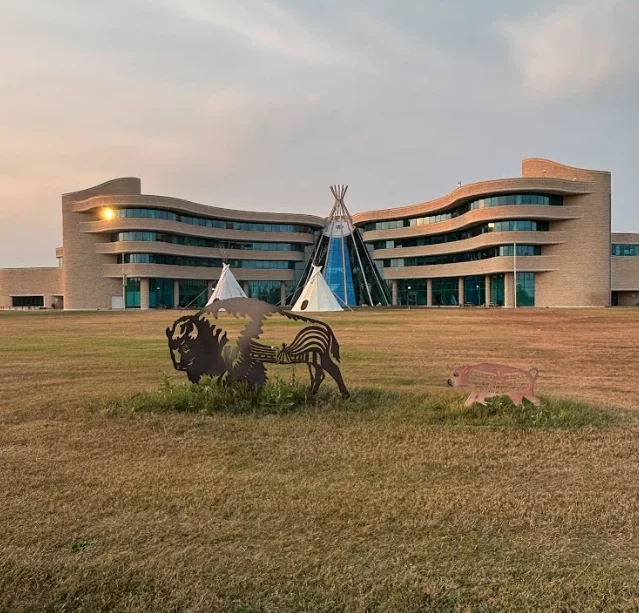A (re)introduction to the FNUniv (No you don’t have to be Indigenous to attend this school)
After three years of living and studying at the University of Regina (U of R), it is no surprise to me that many new or returning students have no real idea on what opportunities lay around the campus, or even right next door!
A topic of interest I have noticed being brought up by many of the first years I live with are about the federated colleges at the U of R. The majority of students and residents I have talked to know they exist. What many do not know about are the services they provide not only to their registered students but also U of R students.
An important thing to remember is that the federated colleges on campus are mostly autonomous schools. The only affiliation they really have with the University of Regina are their campuses on the University property, and their abilities to grant their students degrees through the University. Each federated college offers students a unique approach to campus life, and education. How each college delivers and prioritizes content is different, and allows each to shine in its own way.
An Indigenous-led institution
One of these institutions I would really like to bring to light is found in the northeast corner of campus. Here sits a lone building on a field of flowing grass. It seems unremarkable as you approach it from behind, but as if the clouds part after a storm, the building unfolds revealing its massive glass Tipi situated in the center, the walls flowing around it in an embrace of protection. This is the campus of the First Nations University of Canada (FNUniv).
Founded as the Saskatchewan Indian Federated College (SIFC) in 1976, it was renamed to the First Nations University of Canada in 2003 when their current campus opened. The former name can still be found on the official crest of FNUniv on all of their campuses.
At the time of its founding, FNUniv had only nine students enrolled. As of 2023, they have had over 12oo registered students on all three of their campuses (Regina, Saskatoon, and Prince Albert). At the Regina campus, you will find a healthy mix of U of R students taking classes alongside FNUniv students. While students can register to be students of FNUniv, any student on campus can take classes in the building.
Like the other federated colleges on campus, FNUniv shines in its own unique way. It is an Indigenous owned and operated campus that offers additional support for their students, such as the Indigenous Continuing Education Center (ICEC), the pamināwasowin child care center, and the newly opened Career Center in partnership with The Co-operators. The school also provides their own academic advisors and financial aid and support.
FNUniv provides university credit courses rooted in Indigenous knowledge and cultural practices. The resources and Elders on campus allow both Indigenous and non-Indigenous students to learn topics in a unique and traditional way that blends culture and academic success together.
FNUniv courses are open for everyone to take and are recommended by the university. However, the students registered under FNUniv get priority over University of Regina students for every course they offer, so getting into certain classes can sometimes be more challenging to some students. Even if you do miss one class, there are countless others to try! Many of FNUniv’s courses are offered online to allow for accessibility, but to get the full experience the school has to offer, attending a class in person is highly recommended. You feel a sense of community when you walk through the campus doors.
The resources and Elders on campus allow both Indigenous and non-Indigenous students to learn topics in a unique and traditional way that blends culture and academic success together. – Brielle Armbruster, students, UofR
An architectural work of art and culture
The building itself, created by Canadian architect Douglas Cardinal, was opened to students and faculty in June of 2003. Cardinal’s unique style of architecture gives FNUniv its signature look that we all remember seeing for the first time when we arrive at the university. The Veterans Memorial Tipi (also nicknamed, the Atrium) is the perfect place to study or attend a traditional ceremony. It reaches to the top of the building, allowing as much natural light as possible. Within the Atrium sits the ceremonial tipi (little tipi). The ceremonial tipi is also constructed from glass and allows a look into the ceremonies that are held there. Pipe ceremonies are held every second Thursday of the month, and are open to all. Attending one for the first time can seem unfamiliar and even scary to some, but know that you will be greeted with open arms and have the opportunity to experience and recognize the importance of ceremony.
Navigating the FNUniv building is like flowing down a winding river. Narrow hallways and floor-to-ceiling windows allow the campus to have an ‘open to nature’ feeling. The building’s natural curves allow every room to feel open.
The library, located on the south east side of the building features a collection of articles, books, and more from Indigenous authors and scholars. The library contains some unique and important documents, including copies of Treaty 4 and Treaty 8 within the special collections. The staff are welcoming and can help with any questions.
Kôkkom Bea’s Cafe (named after the late Elder Beatrice Lavelee) is a wonderful place to pick up a coffee or a bite to eat between classes. Nestled at the east wing of the campus, the cafe offers a soup and lunch special of the day, and plenty of other snacks available to students at prices that won’t break the bank! If you wish to try bannock, the cafe offers it fresh with their soup. I cannot recommend it enough. The staff there are always very friendly and welcoming.
A place for all
I’m not an FNUniv student, but I felt welcomed the second I walked through the doors. In a strange sense, FNUniv has a very familiar, almost nostalgic feeling to it. I met many new people and the sense of community was outstanding. I recommend signing up for classes in-person rather than online to get the full experience of this vibrant campus. Most classes are interactive and have active discussion in the topics they cover. Laughter is a common sound in any class.
Just because FNUniv is its own facility and school operating outside of the U of R does not mean that you should avoid taking classes or paying a visit. Both universities collaborate together for this very reason so that the students can experience both camouses. Struggling to find a language credit, consider taking Cree. Need an Indigenous studies credit? There is a vast amount of courses in their catalogue that cover topics related to Indigenous culture that might interest you. And each course works collectively with the Elders’ office to keep them as rooted in the culture as possible, giving you, the student, the most authentic experience possible.
The next major event FNUniv is hosting is their annual Smudge Walk on September 25. You can find more information about this at their website and social media. The walk is a great way to introduce yourself to the campus and its community, and reflect on Indigenous history and culture.
I was grateful to get the full tour of this amazing campus, and I recommend all students to make it a regular stop in their schedules. You will be introduced to an incredible new side of learning.





